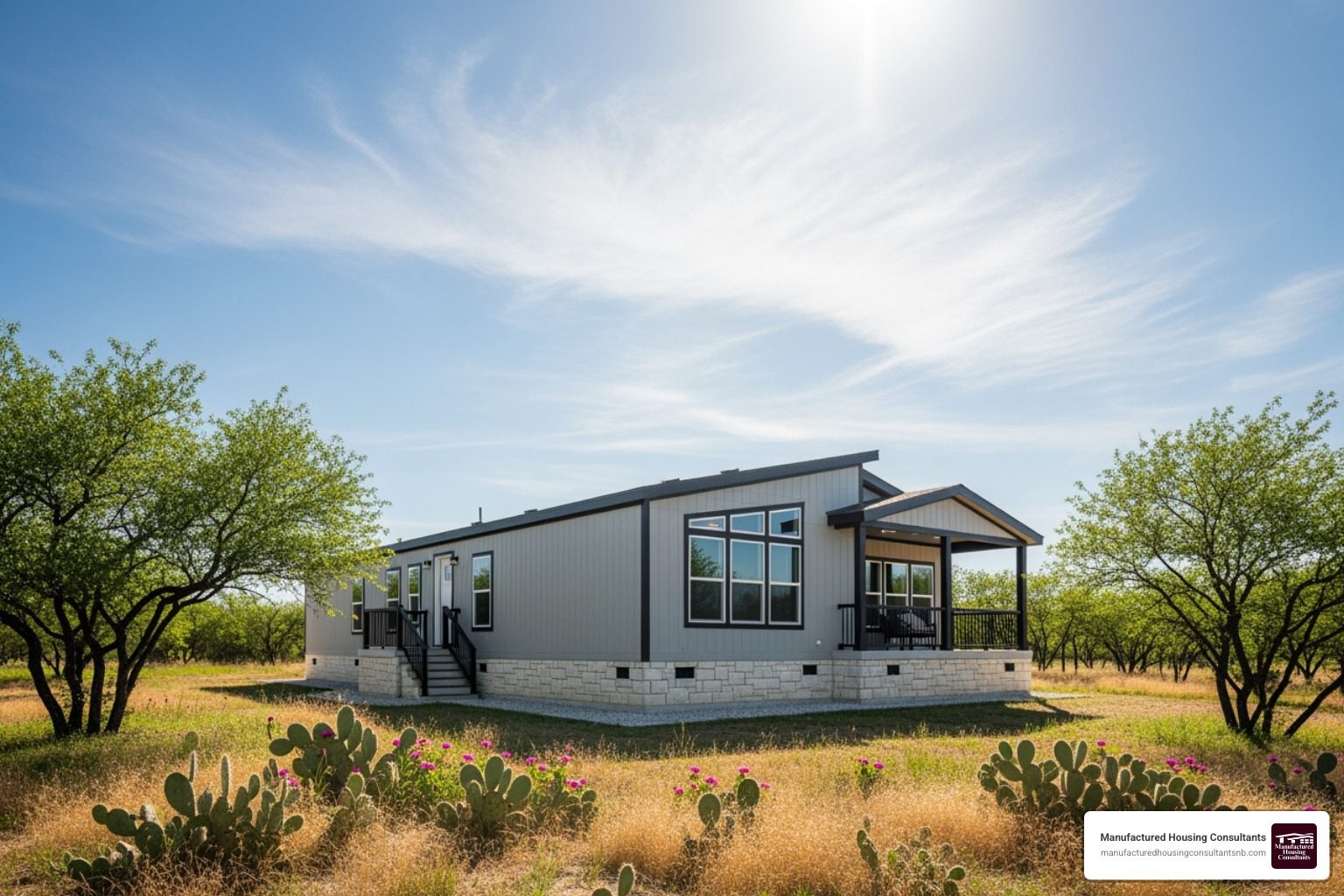Beyond the Skirt: Can Your Manufactured Home Have a Basement?
Unlock value & space! Discover if a manufactured home basement foundation is right for you. Learn benefits, costs, and how to build in Texas.
Why Manufactured Home Basement Foundations Matter in Texas
A manufactured home basement foundation is a powerful upgrade that can transform your house into a more valuable, spacious, and permanent residence. While not every home is designed for it, adding a basement is a popular choice for Texas homeowners seeking long-term value.
Quick Answer:
- Yes, manufactured homes can have basements – but not all homes are structurally designed for it
- Cost range: $12,000-$50,000 depending on excavation, walk-out features, and local conditions
- Key requirement: Must meet HUD Permanent Foundation standards and local building codes
- Major benefits: Extra living space, storm shelter, increased property value, permanent foundation status
- Main challenges: High upfront cost, moisture management, need for professional engineering
Modern manufactured homes, when placed on a basement, appreciate at rates similar to site-built homes and qualify for better financing like FHA and VA loans. In the New Braunfels area, we see homeowners increasingly choose basements for storm protection and extra living space.
However, this upgrade requires a significant investment, professional engineering, and careful moisture management to handle the Texas climate. It also involves strict adherence to HUD standards and local building codes. At Manufactured Housing Consultants, we help Texas homeowners steer these factors to decide if a basement foundation is the right fit for their budget, land, and long-term goals.
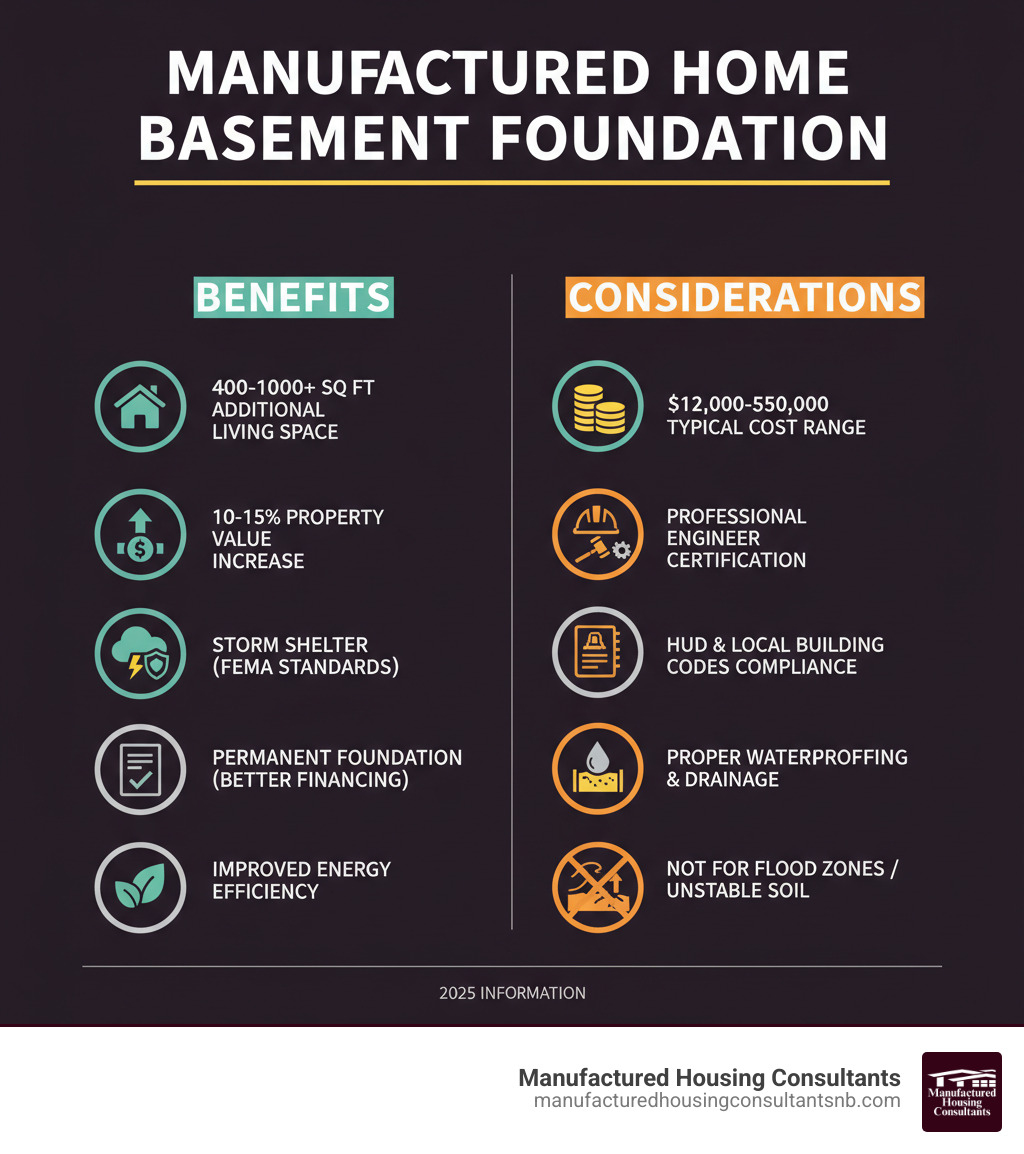
Relevant articles related to manufactured home basement foundation:
Your Complete Guide to a Manufactured Home Basement Foundation
This section answers the core questions about feasibility, benefits, challenges, and requirements, with a focus on Texas homeowners.
Benefits vs. Challenges: Is a Basement Right for You?
Choosing a manufactured home basement foundation involves weighing significant benefits against real challenges. Here’s a breakdown to help you decide.
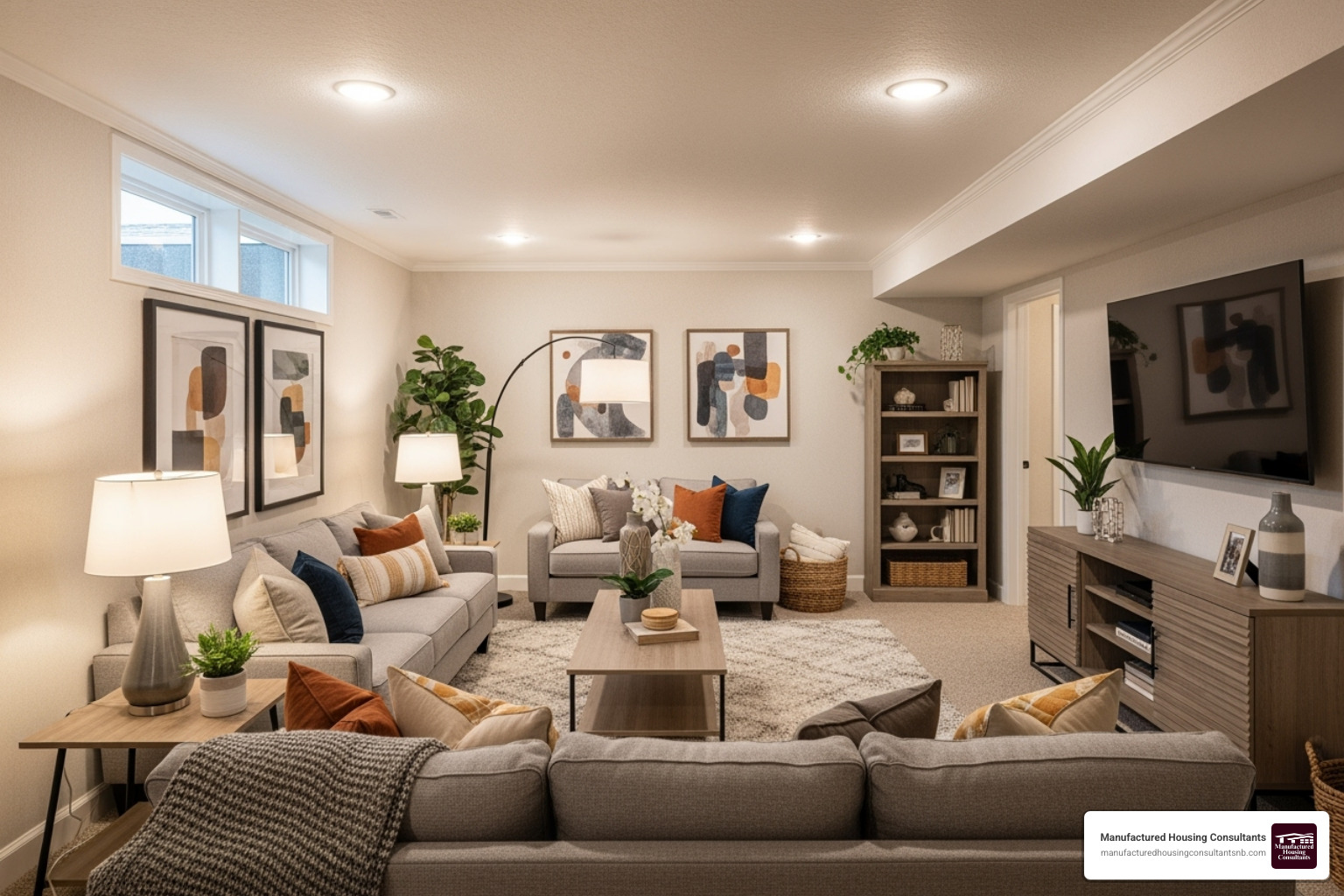
Key Benefits:
- Increased Property Value: A permanent basement makes your home feel like a conventional residence, boosting appreciation and resale value.
- Extra Living Space: Gain hundreds of square feet for bedrooms, a family room, or a home office.
- Storm Safety: A basement provides a secure, below-ground shelter that meets FEMA standards for storm protection—invaluable in Texas.
- Energy Efficiency: The earth insulates the basement, keeping your home cooler in the summer and reducing energy bills.
- Improved Stability: A basement firmly anchors your home, ensuring greater longevity and less maintenance.
Main Challenges:
- High Foundation Costs: Basements are the most expensive option, ranging from $12,000 to over $50,000 for a walk-out.
- Structural Compatibility: Not all manufactured homes are designed to support the load distribution of a basement.
- Moisture and Waterproofing: Texas’s humid climate and clay soils require robust waterproofing and drainage systems to prevent mold and structural damage.
- Code Compliance & Professional Expertise: The project requires licensed engineers, experienced contractors, and adherence to strict HUD and local building codes. This is not a DIY job.
Structural and Regulatory Requirements
Building a compliant manufactured home basement foundation requires navigating federal and local rules. Here’s what you need to know.
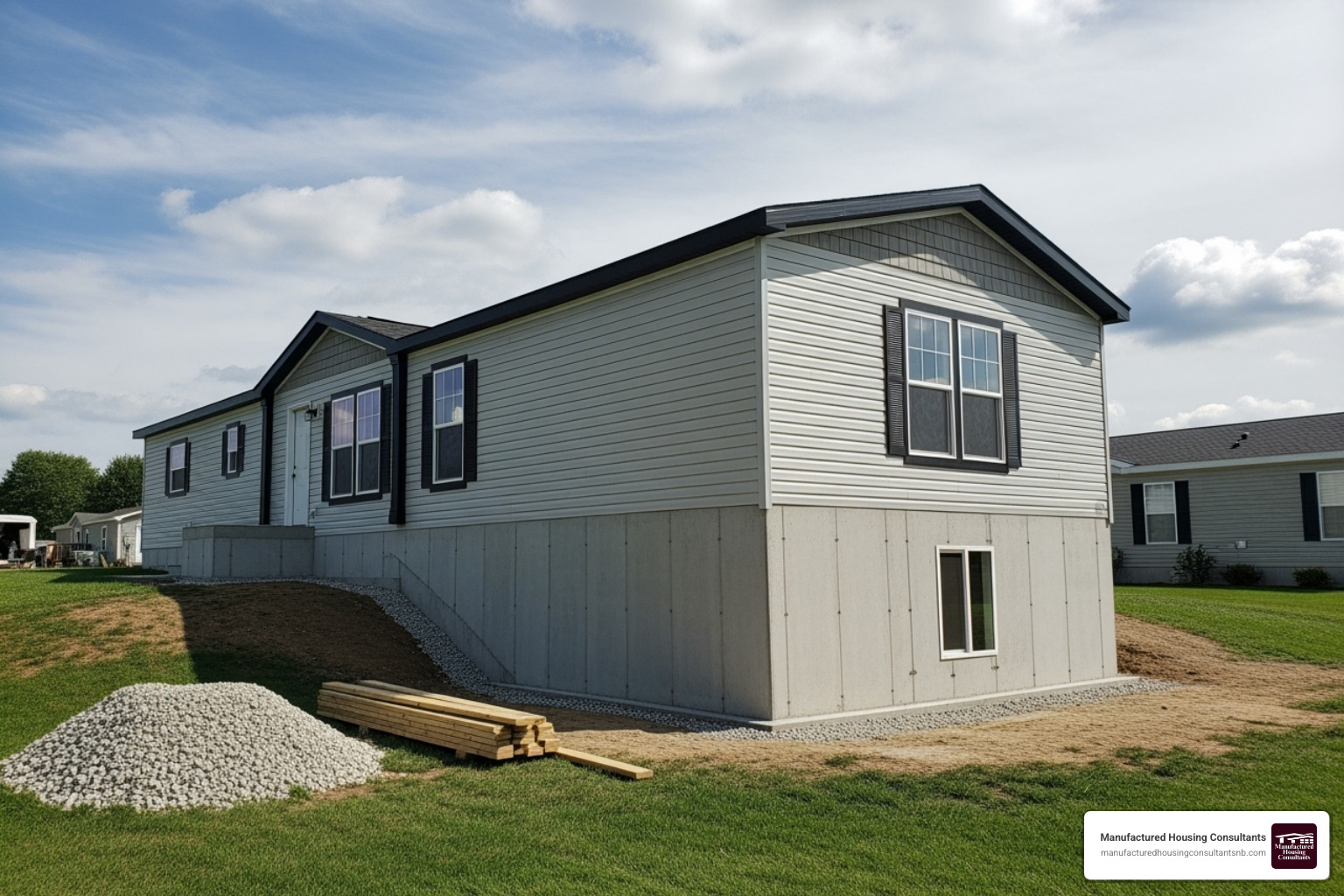
- HUD Permanent Foundation Standards: Your basement must be built to the specifications in HUD’s Permanent Foundations Guide for Manufactured Housing. This is what classifies your home as “real property” for financing and value.
- Professional Engineer Certification: A licensed engineer must design and certify that the foundation meets all federal and local standards. This is non-negotiable.
- Local Building Codes (New Braunfels & Texas): Beyond HUD, you must comply with local rules. This includes securing building permits, ensuring your property is properly zoned, and conducting soil tests, which are critical in areas with Texas’s expansive clay.
- Home’s Structural Design: The manufacturer’s specifications must confirm that your home model is compatible with a basement foundation. Our team at Manufactured Housing Consultants can help verify this.
For more context on foundation requirements, see our guide on the Mobile Home Foundation.
The Cost and Financing of a Manufactured Home Basement Foundation
Understanding the costs and financing benefits is key to planning for a manufactured home basement foundation.
Cost Breakdown: Expect to invest $12,000 to $25,000 for a standard basement. A desirable walk-out basement can cost $50,000 or more. Key cost factors include excavation complexity (especially in rocky or clay soil), labor, materials, and site-specific challenges.
Financing Advantages: A basement is a game-changer for financing. By meeting permanent foundation standards, it makes you eligible for:
- FHA and VA Loans: Government-backed loans with favorable terms that are often unavailable for non-permanent foundations.
- Conventional Mortgages: Your home can qualify for the same mortgage products as site-built homes, leading to competitive rates.
- Higher Appraisal Value: Lenders recognize the added value and stability, which improves your loan terms.
We recommend exploring our guide on Mobile Home Foundation Types to understand how different foundations impact financing.
The Construction Process: From Dirt to Done
Building a manufactured home basement foundation is a multi-step process that demands professional oversight.
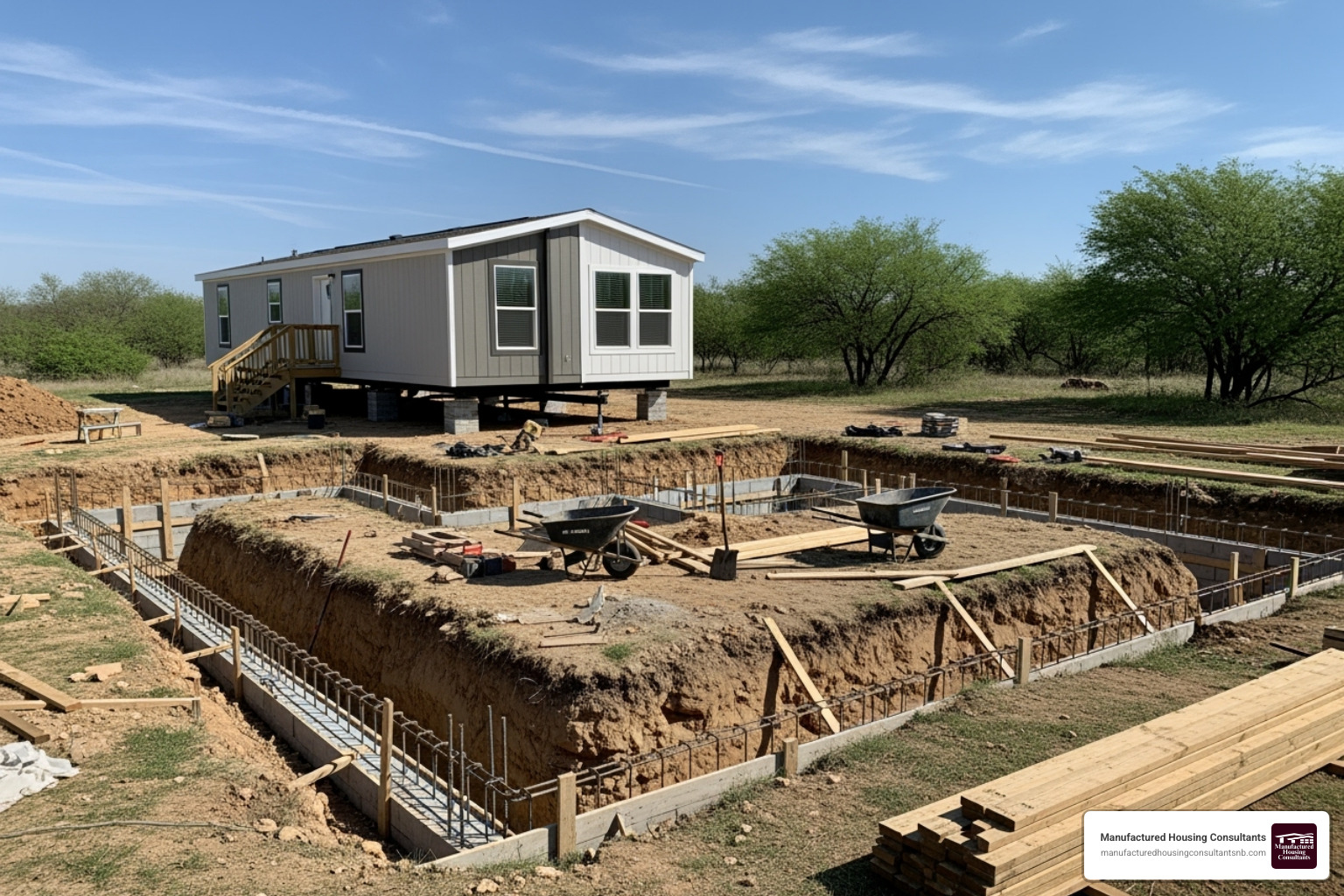
- Site Evaluation and Soil Testing: Professionals assess your land’s topography, drainage, and soil composition.
- Foundation Design and Engineering: A licensed engineer creates a custom blueprint for your home and property.
- Permit Acquisition: All necessary building permits are secured from local authorities in your Texas city.
- Excavation and Footings: The site is excavated, and concrete footings are poured to create a stable base.
- Wall Construction & Waterproofing: Basement walls are built and treated with exterior membranes and drainage systems to manage water.
- Setting the Home: The manufactured home is carefully lifted by a crane and permanently anchored to the foundation.
- Utility Connections and Finishing: Water, sewer, and electrical lines are connected, and the interior can be finished.
This entire process requires licensed contractors and engineers. For design inspiration, see our Manufactured Home Design Ideas.
Moisture, Waterproofing, and Maintenance in Texas
For a manufactured home basement foundation in Texas, managing moisture is critical for long-term success.
The Texas Challenge: High humidity, expansive clay soils, and heavy rainfall make basements vulnerable to moisture. Proper waterproofing isn’t optional—it’s essential.
Key Waterproofing Solutions:
- Exterior Waterproofing Membrane: A “raincoat” applied to the outside of the basement walls.
- Perimeter (French) Drain: A system to collect and redirect groundwater away from the foundation.
- Proper Grading: The ground must slope away from the house to shed rainwater.
- Sump Pump: A pump to automatically remove any water that collects in a basement pit.
Ongoing Maintenance: Annually inspect for cracks, keep gutters clean and downspouts extended, and ensure the grading around the foundation remains sloped. Important Note: Basements are not recommended in designated flood zones.
For more details, visit our page on Basement Foundation for Mobile Home.
Are There Alternatives to a Full Basement?
While a manufactured home basement foundation is an excellent choice, other options may better fit your budget or property.
- Crawl Space Foundation ($6,000 – $15,000): A good middle ground that lifts the home, allows utility access, and can qualify as a permanent foundation. It doesn’t offer living space but works well on sloped lots.
- Slab Foundation ($4,000 – $10,000): A cost-effective concrete slab. It’s fast to install and durable but offers no under-home access for repairs, a major drawback for manufactured homes. Best for flat lots.
- Pier and Beam System ($1,000 – $2,000): The most affordable option, but often considered non-permanent by lenders. It provides great utility access but may require periodic re-leveling.
For a full comparison, see our Mobile Home Foundation Types Guide.
Is a Basement Foundation Your Next Step?
So, is a manufactured home basement foundation the right choice for you?
It’s a significant investment, with costs from $12,000 to $50,000, but the payoff is equally significant: more living space, improved storm safety, and a major boost to your home’s long-term value. For many Texas homeowners looking to establish permanent roots, it’s a transformative upgrade.
The decision comes down to your budget, your property’s characteristics, and your long-term goals. Does the added cost fit your financial plan? Is your land suitable for excavation? Are you planning to stay in your home for years to come?
At Manufactured Housing Consultants, we help families in New Braunfels and across Texas answer these questions every day. Our team understands the local soil conditions, permit requirements, and construction challenges unique to our area. We can help you determine if a basement is the best fit, or if an alternative like a crawl space or slab foundation better suits your needs and budget.
Ready to explore your options? Let’s figure out the perfect foundation for your dream home together.
Explore our inventory of homes suitable for various foundations

